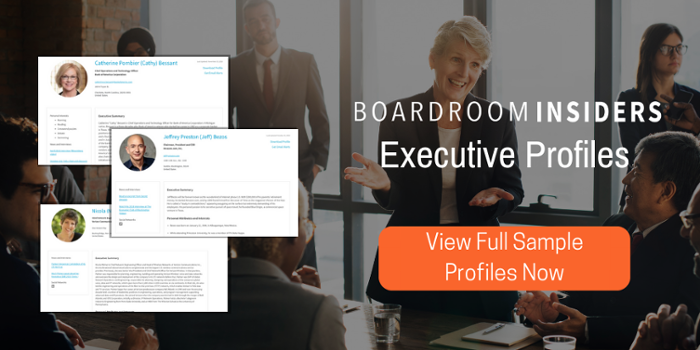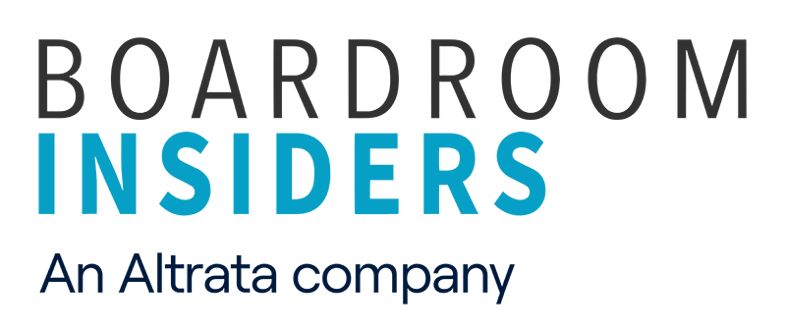
LinkedIn is beyond amazing. Those who remember what it was like before LinkedIn know that it has transformed so many aspects of business, especially recruiting and sales.
So yes, we love LinkedIn and believe it to be an essential business tool.
However, if you are an enterprise sales or marketing pro focused on C-suite selling, LinkedIn is not a silver bullet. It simply does not provide the insight required to engage a Fortune 500 key decision maker.
In fact, LinkedIn can give you a false sense of security going into important meetings. You think you have done your due diligence by looking at a few LinkedIn profiles, but halfway through the meeting it can become painfully apparent that you don’t know what you don’t know.
For example:
- A few years ago a BYOD vendor met with a technology executive at a major bank, unaware that the executive had just proclaimed in an interview that the organization was adamantly opposed to BYOD. Ouch.
- A SaaS vendor met with a banking operations head who said publicly that she hates jargon, especially the terms “cloud” and “big data.” The vendor’s sales lead proceeded to deliver a jargon-filled pitch that included both terms. Oops.
- At an important executive briefing, an SVP watched in embarrassment as his ill-prepared sales team fumbled its way through a meeting with a customer CIO, asking basic questions that they should have researched before the meeting. He vowed never to support this team again. Yikes.
LinkedIn would not have prevented any of these scenarios because you don’t find this stuff in LinkedIn profiles. An executive is not going to write in her LinkedIn profile: “I hate jargon, so don’t use it when you meet with me.”

Here are a few more important things that LinkedIn profiles don’t always tell you:
- What the executive’s company or division does: While some people include this information in their profiles, many do not.
- Functional responsibilities: Many people just include their titles without saying what they are actually responsible for. So if you are looking for the person responsible for digitization, how do you know you have the right person? A title does not always tell the story.
- Personal attributes, interests and passions: While some executives post their hobbies and interests, most do not.

The executives’s current strategy/objectives/priorities
Has the company announced a sweeping cost-cutting initiative? Are they consolidating vendors? Do they have a blank check for cybersecurity? These are three examples of real initiatives at real companies. How helpful would it be to know these things going into a meeting? And how dangerous would it be to go in not knowing these things?
What the person has said
Senior executives give interviews and some participate in quarterly earnings calls. Do you know what they are talking about? There is no better way to get an executive’s attention than to use his own words. This shows not only that you have done your homework, it demonstrates a level of interest and due diligence that most vendors lack. Are you going to get this from a LinkedIn profile? Not likely.
Current operating environment
Has there been an executive shakeup? A reorg? Layoffs? An IPO? A product recall? A merger? A new boss who plans to shake things up? All of these things could impact your deal, so you should know about them.
We love LinkedIn. But it’s just a starting point. If you really want to make a favorable impression with deep insight into an executive’s priorities, challenges and interests, you’ll need more than LinkedIn.
That’s why we created Boardroom Insiders.
.png?width=970&height=485&name=Copy%20of%20What%20LinkedIn%20Wont%20Tell%20You%20(1).png)
While LinkedIn tells you who to call on, we tell you what they want to talk about.
While LinkedIn is one of dozens of sources we use to prepare Boardroom Insiders Executive Profiles, we research everything above that LinkedIn is missing.
LinkedIn is an essential tool, but the profiles are unpredictable, limited in strategic insight, and biased. Boardroom Insiders is rich with strategic insight, unbiased, and provides the full professional story of the key decision maker you are calling on.
Want to see how we compare to a LinkedIn profile? Check out our Executive Profile samples.







Share Your Thoughts